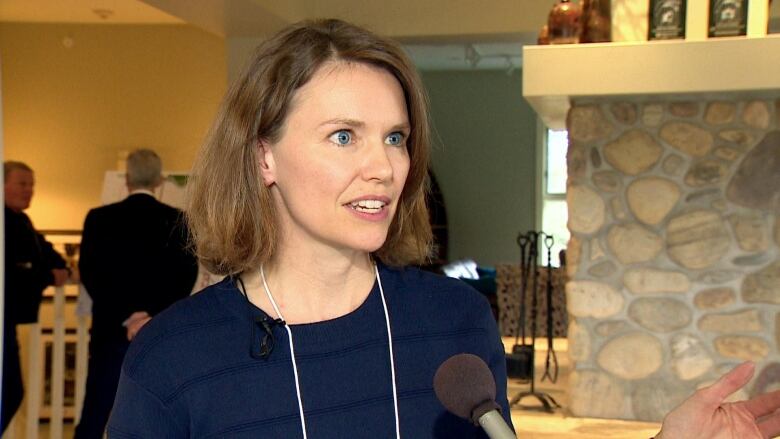Construction begins on Springbank reservoir intended to protect Calgary area from floods
Project is budgeted at $744M; Springbank community association not satisfied
The long-awaited and sometimes controversial Springbank off-stream reservoir project (SR1) is now underway, the provincial government announced Thursday, with the construction contract awarded to Vinci Infrastructure Canada.
The project is intended to protect Calgary from floods such as the one that hit the region in 2013, causing widespread devastation. That event resulted in an estimated $5 billion in damage, killed five people and forced tens of thousands to evacuate.
"After years of consultation, of preparation, construction has begun. This is a major moment and great news," said Premier Jason Kenney at a news event held on St. Patrick's Island in the Bow River, which flows through Calgary.
The premier said the project is likely to create some 2,200 construction jobs. It is projected to be partially complete in 2024 and fully complete by 2025.
The reservoir will be constructed near the rural community of Springbank, Alta., located west and upstream of Calgary.

Funding estimates
The province allocated $744 million in total and $474 million over the next three years for the project as part of the 2022-23 budget. It received up to $168.5 million in federal funding.
Vinci Infrastructure Canada provided the lowest bid for the project, at a cost of $379 million, according to the province.
But Kenney said Thursday that $576 million of that total budget will be provided by Alberta taxpayers through the provincial government; that's up from a previously pegged figure of $432 million.
"Since the approved budget five years ago, in 2017, construction, materials, utility and pipeline relocation costs have risen significantly," said Rob Williams, press secretary for Alberta's minister of transportation, in an email.

Ward 5 Coun. Raj Dhaliwal, who attended Thursday's press event, said the project would add safety and economic viability to Calgary's downtown.
"With SR1, we know that we will have a sustainable downtown that will not be negatively impacted by flooding," Dhaliwal said.
SR1 will create a reservoir area of 3,700 acres, Kenney said. The project will redirect water from the Elbow River into a dry reservoir should an extreme flood event occur.

"We all know that there is incredible devastation that can happen in our city if we don't address flood mitigation properly," said Calgary Mayor Jyoti Gondek during a news event held at Calgary's Glenbow Museum.
"So a project of that nature and size is welcome news. It is also very good news for our economy."
Some community members left unsatisfied
Karin Hunter, president of the Springbank Community Association, said the group first heard the news of the construction on Wednesday night from a local Rocky View County councillor.
"So we were not aware of any announcement or construction starts for the SR1 project," she said.
"And that despite numerous requests from the community associations and interested residents to Alberta Transportation for more information on the project."

Hunter said delays in receiving that information represented a failure in engagement given the group's "intimate involvement in the project" over the past few years.
"I would put a public call out to Alberta Transportation to step up and be better and talk to the community," she said.
During Thursday's event, Transportation Minister Rajan Sawhney acknowledged there had been controversy associated with the project for a number of years.
She said the project had voluntary negotiation on all of the land acquisition, with no expropriation involved.
"While we'll never have 100 per cent agreement on the project itself, I think we've done tremendous work, and the fact that we've had no expropriation speaks volumes," she said.
Last summer, the province said it still had remaining work to do to purchase the land required, which had received significant pushback from nearby landowners for years.